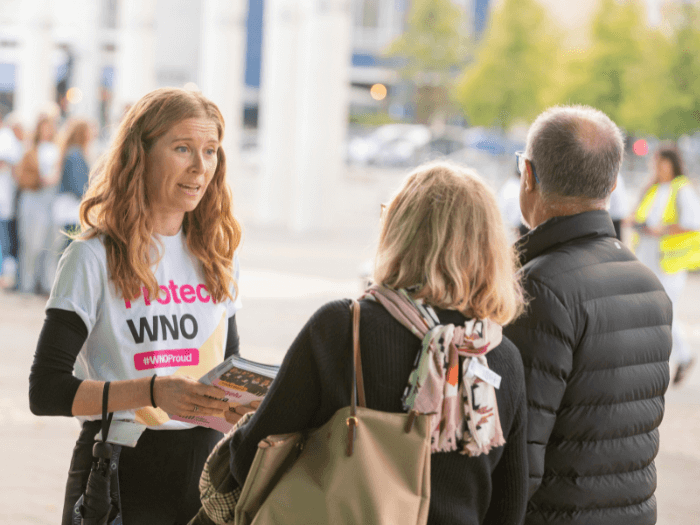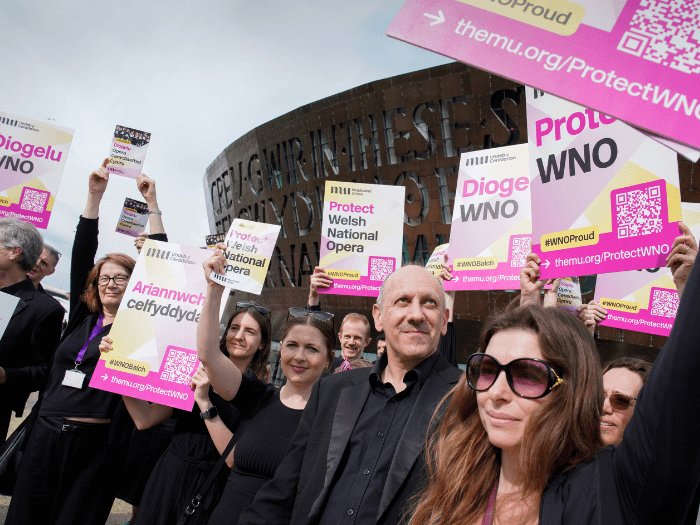It’s no secret that the arts sector is in crisis. Musicians’ livelihoods feel increasingly precarious, and at a time where society and humanity surely need art and culture more than ever.
Years of cuts and underfunding have squeezed the UK’s arts organisations both large and small, with government funding for culture now amongst the lowest in Europe.
So it was in this context that I found myself, nine months into my new and exciting full time job in the orchestra of Welsh National Opera, facing the worrying news that my employer was facing a huge funding cut from Arts Council England.
More cuts followed from Arts Council of Wales, and soon the company was cancelling performances, offering redundancy to all non-performing staff, and proposing to cut the orchestra and chorus to part time. Before long, we were taking part in the most sustained industrial action in the MU’s 132-year history.
Securing jobs and a sustainable future for opera in Wales
So what drove us to campaign? With a shortage of freelance work in Cardiff and Wales, musicians wouldn’t be able to afford the reduction to part time work, and many of this highly skilled workforce were having to consider leaving the profession altogether.
We wanted to campaign not only for the security of our jobs, but for the sustainable future of WNO - the largest touring opera company in Europe.
We also wanted to campaign against the damage being done to the opera sector as a whole, and against the devaluing of arts and culture by successive governments. Sustainable jobs in the arts is how to protect the future of the arts.
 WNO members leafleting members of the public in Cardiff as part of their Action Short of Strike on 21 September 2024. Image credit: Adam Gasson/PA Media Assignments.
WNO members leafleting members of the public in Cardiff as part of their Action Short of Strike on 21 September 2024. Image credit: Adam Gasson/PA Media Assignments.
Campaigning in the workplace for the first time
I’d been a member for a long time and had always been interested in politics and policy. But for many of us, this was our first time being actively involved in a member-led campaign.
We were working alongside the chorus, represented by Equity and campaigners such as Elizabeth Atherton, who organised a protest performance on the steps of the Senedd and wrote an open letter criticising the cuts, delivered to Wales’ First Minister with over 175 signatures from high profile names such as Bryn Terfel, Ruth Jones and Michael Sheen.
A petition was launched and we were handing out leaflets to audience members outside venues before the shows, asking for their support.
In order to take our campaign messages into the workplace, we needed to ballot on industrial action. This in itself felt quite daunting to some members. With overwhelming support for both full strike action and action short of strike (ASOS), we embarked on seven months of ASOS, running concurrently with negotiations between the Union and WNO management.
 Orchestra players attended a demo and leafleting session outside of The Wales Millennium Centre. Image credit: Alistair Heap/PA Media Assignments.
Orchestra players attended a demo and leafleting session outside of The Wales Millennium Centre. Image credit: Alistair Heap/PA Media Assignments.
We held rallies outside the Wales Millenium Centre, and being one of the ‘gobbiest’ members of the orchestra, I gave speeches at those rallies and at the Oxford New Theatre at the end of a performance of Rigoletto.
Talking to audience members and meeting MPs
As much as it was a very stressful time for the orchestra, the collective action also fostered a sense of camaraderie, with members volunteering to be on a rota for leafleting before shows - including in the depths of winter in terrible weather!
The conversations we had with audience members were often morale boosting, with people from all backgrounds telling us how important live music was for connecting to their deepest selves, and how much they appreciated WNO’s visits.
Wearing our protest t-shirts with the slogans “Protect WNO” and “Diogelu WNO” during performances also sparked conversations and media coverage.
It was heartening to see the petition numbers tick up after every show, and support being shared on social media.
The MU also organised for us to meet with MPs and Senedd members, who were great at listening to and supporting our campaign.
Signing a new contract
The industrial action came to an end in April 2025 when a new contract was signed. It protects full time contracts for all the existing players until August 2026, although we have lost 10 currently vacant positions.
The 40 players we have left make up an oddly shaped opera orchestra, and we rely on fantastic freelancers to fill in the gaps when they’re available. So, the campaign to restore funding and secure the future for WNO continues.
The company has been battered by the funding cuts - the chorus went through compulsory redundancies by audition this summer, and have been reduced to 20 musicians, having historically been at 40.
A huge number of office-based staff have been lost, leaving the administration precariously understaffed.
Audience members are often visibly cross at the reduction of WNO visits to their towns and cities, alongside the world leading community and education work we do in those locations.
Collective action can make a difference
Although not out of the woods yet, being part of this campaign has been incredibly valuable.
As an orchestra we now have better engagement with our new and inspirational General Directors - Adele Thomas and Sarah Crabtree – and are campaigning together for a better, more sustainable funding package for WNO.
For me personally, the campaign has strengthened my sense of belonging and connection to the orchestra, the WNO, the MU and the wider arts community.
I have subsequently become more active within the Union, continuing to build our campaign at WNO alongside other members of the orchestra, being elected onto the MU Equality, Diversity and Inclusion Committee, and representing Wales and South West England as a delegate for the recent MU Delegate Conference. I’ve seen that, as campaigners, through collective action, we can make a difference.
@wearethemu
Welsh National Opera needs your help‼️ Funding cuts are forcing WNO management to make major changes to the company, and the orchestra and chorus are under threat. WNO is a multi-award winning, internationally renowned organisation. It represents the best of Welsh and UK arts. Any cuts would be a major loss for culture and the arts as a whole. Please sign our petition to help #ProtectWNO: theMU.org/WNOBalch Video description: Multiple pieces to camera, featuring various members of WNO outside the Mayflower Theatre in Southampton. Various cutaways to striking members outside the theatre and split screen visuals of WNO performances. #Musicians #MusiciansOfTikTok #MusiciansUK #TradeUnion #MusiciansUnion #UnionStrong #WNO #Opera #SavetheArts #SaveWNO #WNOProud
♬ original sound - WeAreTheMU - Musicians' Union (MU)
Lastly, I’d like to thank all the MU staff who hugely supported us throughout the campaign and the negotiations, especially Head of Orchestras Jo Laverty, Wales and South West England Regional Organiser Andy Warnock, and Campaigns and Organising Official Sinead McCarney.